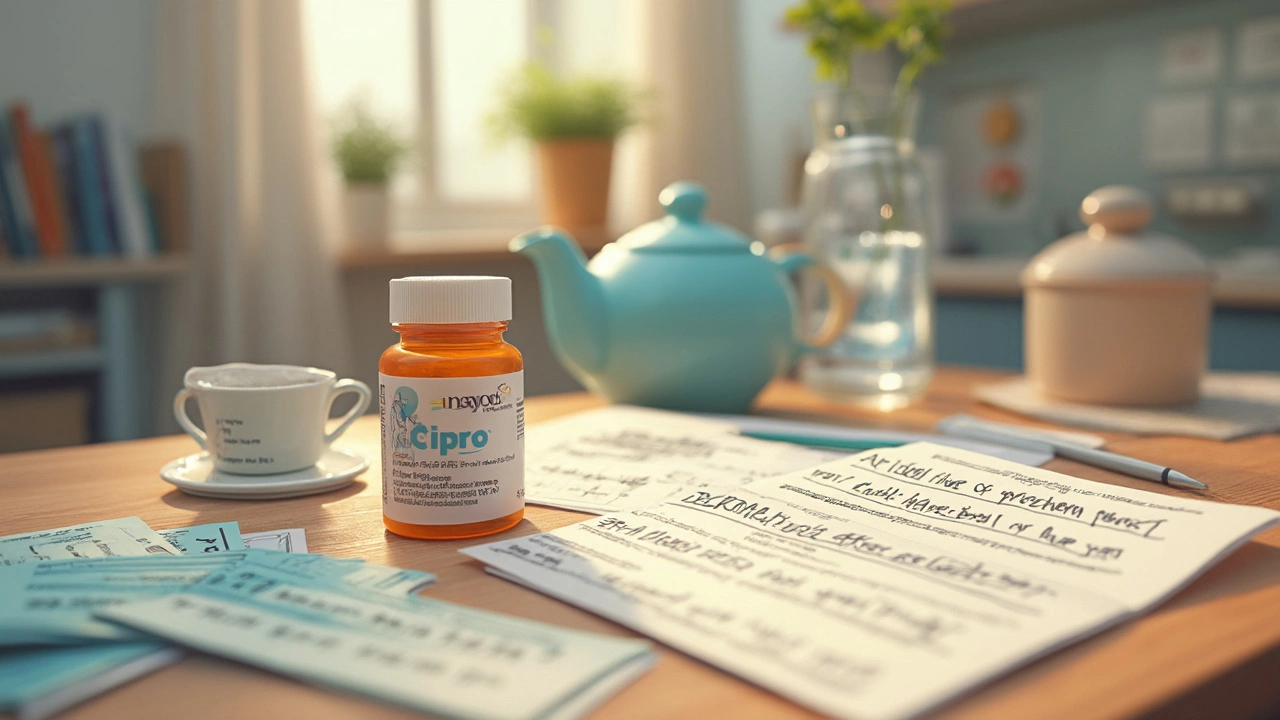Bacterial infections don’t play fair. They can turn a normal week upside down, and suddenly you’re ransacking your medicine cabinet for relief. Cipro, short for ciprofloxacin, is one of those drugs that’s probably popped up on a prescription label at some point—especially if your body’s been in a showdown with a stubborn infection. But there’s a lot more to Cipro than just knocking out bacteria; it’s a medication that stirs up some debates, comes with some clear warnings, and has definitely saved a few vacations (trust me—Miranda still brings up the time Cipro got her through a surprise UTI in Spain). You want the facts beyond the pharmacy pamphlet? Here they are.
What Is Cipro and How Does It Work?
Cipro, which is short for ciprofloxacin, belongs to a group of antibiotics called fluoroquinolones. It’s not another penicillin cousin—instead, it’s a much broader hitter, and it tackles a wide variety of bacterial nasties that more common antibiotics often ignore. Doctors prescribe it to zap infections in the urinary tract, respiratory system, skin, bones, gut, and even some dangerous food poisoning jobs. Its claim to fame is its ability to halt bacterial DNA from replicating, which is like jamming a giant ‘pause’ button on an infection’s game plan.
Here’s a wild fact: the World Health Organization actually keeps ciprofloxacin on its List of Essential Medicines, which pretty much tells you it’s made a global impression. And it’s not new; Cipro’s been bouncing around since the late 1980s, trusted in hospitals and clinics around the world. But, even though Cipro is battle-tested, it’s never a free-for-all. Doctors these days are especially careful because bacteria are getting smarter and developing resistance, especially to the strongest antibiotics.
If you’re wondering how quickly it works, Cipro is absorbed well and starts fighting in as little as 1 to 2 hours after your first dose. Its bioavailability is around 70%, which means a big chunk of each pill actually makes it to the bloodstream. For a quick reference, here’s a look at how Cipro compares to other common antibiotics:
| Antibiotic | Spectrum | Bioavailability (%) |
|---|---|---|
| Ciprofloxacin (Cipro) | Broad | 70 |
| Amoxicillin | Narrow | 95 |
| Azithromycin | Broad | 37 |
That’s part of why Cipro gets chosen when other meds don’t cut it—its reach and strength are serious. But it’s not something doctors hand out for mild sniffles or viral colds. When used the right way, Cipro is a real infection fighter. Use it recklessly, and we risk encouraging more bacterial resistance, which is a nightmare scenario, especially in hospitals.
Common Uses for Cipro
Here’s where things get personal. Cipro is the go-to for some really relentless bacteria, and doctors tend to reach for it when more basic antibiotics fail or a particularly tricky germ is lurking. The most frequent reason people land on Cipro? Urinary tract infections (UTIs). Anyone who’s lived through a UTI knows how desperate you are for quick relief, and Cipro is one of the heavy hitters here. It’s also a stand-by for treating traveler’s diarrhea—so if you’ve ever relied on those little white pills to make it through a trip abroad, you’re not alone.
But the uses stretch further:
- Respiratory Tract Infections: things like pneumonia or chronic bronchitis when the regular meds aren’t working.
- Skin and Soft Tissue Infections: for more severe cases, including certain types of cellulitis.
- Bone and Joint Infections: sometimes, nasty bone bugs don’t respond to anything else.
- Gastrointestinal Infections: salmonella, shigella, or even typhoid fever (this is no ‘stomach flu’ territory—real, dangerous stuff).
- Prophylaxis for Anthrax: after that scary anthrax-in-the-mail scare, Cipro found its way into emergency stockpiles.
Doctors have to play matchmaker, though. Not all infections will bow down to Cipro. Some bacteria just aren’t bothered by it, and there’s also a growing catalog of Cipro-resistant bugs that make its job much harder. In 2024, a CDC report highlighted that resistance to fluoroquinolones in E. coli went up by 4% compared to 2020. So while Cipro is handy, it’s not invincible. It’s crucial to take the full course—never stop just because you feel better halfway through. Stopping early only lets bacteria regroup, making your next infection even harder to treat.

Dosage: How Much and How Often?
Here’s where you can’t freestyle—Cipro has a strict dosing schedule. The dose really depends on what you’re treating. For something like a simple UTI, doctors usually prescribe 250 to 500 mg every 12 hours, typically for 3 to 7 days. If it’s a complicated infection, higher doses or a longer time frame might be needed. You’ll often see Cipro in tablet form, but there are also liquid, extended-release, and even IV versions for the hospital crowd. Never break the pills in half unless your healthcare provider tells you—some are made to release slowly, and messing with the pill could throw off how it works in your system.
Here’s a table that gives a snapshot of typical dosing:
| Condition | Standard Dose | Duration |
|---|---|---|
| Uncomplicated UTI | 250-500 mg twice daily | 3-7 days |
| Respiratory Infection | 500-750 mg twice daily | 7-14 days |
| Typhoid Fever | 500-750 mg twice daily | 7-14 days |
| Traveler's Diarrhea | 500 mg twice daily | 1-3 days |
If you miss a dose, take it as soon as you remember unless it’s almost time for your next one. Doubling up to make up for a missed pill is a big no-go. And here’s something people forget: Cipro needs to be taken with a full glass of water, and you should keep hydrated throughout the day. Don’t chase it down with milk, calcium-fortified juice, or antacids containing magnesium or aluminum, because these can block your gut from absorbing the good stuff. If you have to take these things, space them out by at least two hours from your Cipro dose.
Does meal timing matter? Not really—Cipro can be taken with or without food. But if your stomach grumbles or you get nauseous, having a snack with your pill won’t hurt. One more tip: use the same times every day, like 8 a.m. and 8 p.m. Set a phone reminder if you have to. Consistency really matters with antibiotics.
Side Effects and Dangers: What You Should Watch Out For
This is where things get serious. Cipro isn’t candy, and its side effect profile isn’t just some fine print. The most common gripes are pretty mild: feel a bit queasy, have stomach cramps, or maybe get a metallic taste in your mouth. For most folks, these blow over in a few days. But there’s a reason doctors warn you to call instantly if things seem off: Cipro can cause rare but major problems that aren’t easy to spot until they hit hard.
- Tendinitis and tendon rupture: This is the big one you hear about on the news. Cipro can inflame and even snap your tendons, especially the Achilles. It’s rare, but people over 60, those on corticosteroids, and athletes need to be extra careful. That nagging ankle pain during a Cipro course? Don’t just walk it off—call your doctor.
- Peripheral neuropathy: Some people report sudden numbness, tingling, or burning in their hands or feet. If you notice this, quit Cipro and call your provider.
- Mental health changes: It sounds odd, but Cipro can trigger anxiety, confusion, hallucinations, or even seizures. If your mood crashes, memory gets weird, or you see things that aren’t there, stop and get help.
- QT Prolongation: That’s the heart’s rhythm skipping a beat. If you’re taking heart meds or have a history of arrhythmia, make sure your doctor knows.
- Photosensitivity: You might find yourself burning to a crisp after just a little sun. Cipro can turn your skin into a UV magnet, so cover up and slather on SPF 50 while on it.
Allergy to ciprofloxacin is rare but possible. If you break out in hives, can’t breathe, or feel your throat closing up, go straight to the ER—don’t mess around. Another warning: Cipro can interact with other medications, including blood thinners (like warfarin), diabetes meds (like glyburide), and even caffeine. It can boost caffeine’s effects, meaning your morning coffee might hit like five espressos. That was a rough lesson for Miranda, who spent a jittery afternoon after her usual cold brew and Cipro dose.
Children, pregnant women, and breastfeeding moms most often shouldn’t take Cipro unless there’s no better choice. The risks to tendon and joint development are higher in kids, and there isn’t great data on safety during pregnancy. Bottom line: never borrow someone’s leftover antibiotics.

Staying Safe and Getting the Most Out of Cipro
If your doctor hands you a prescription for Cipro, there are a few key things to keep in mind so you get the benefits without playing roulette with your health. First, always tell your provider about other meds you’re taking, even vitamins or supplements. Lots of people don’t realize that minerals like magnesium, zinc, or iron can block Cipro from working right. The same goes for over-the-counter antacids—these need a two-hour buffer zone before or after your Cipro dose.
Stay hydrated. Your kidneys work overtime when processing this med, and drinking plenty of water will help flush things out smoothly. Don’t skimp on your doses or save extras "just in case"—using antibiotics when you don’t need them is like watering weeds in a garden. It just makes the nastier bugs grow stronger. Store your pills at room temperature and keep them away from direct sunlight or moisture so their strength doesn’t fade.
Use sunscreen daily, even on cloudy days. And if you get an upset stomach, avoid alcohol and fried foods until your course is done. If you feel dizzy or light-headed, skip the gym and lay off anything that needs quick reflexes, like driving or climbing ladders. And if you notice any weird symptoms—like pain behind your heel, numb fingers, or the urge to write your memoir at 3 a.m.—let your doctor know right away.
For parents, don’t give Cipro to your kids unless a pediatrician says the risks are worth it. In teens, doctors are sometimes forced to use Cipro when no other drug can tackle a life-threatening bug, but it’s not routine. And pets? Vets do use ciprofloxacin for dogs and cats, but don’t offer your own pills to your furry friend—animal dosing is completely different.
Here’s one more tip for getting the best out of your antibiotic: finish every last pill, even if you’re bored of the taste or totally symptom-free. This is how we all help slow down antibiotic resistance, which keeps Cipro working for everybody who might need it in the future. Yes, it’s annoying—no, it isn’t optional.
So, if your doctor recommends cipro next time you’re wrestling with a serious infection, you’ll know it’s not just a random pick from the shelf. This is a battle-tested antibiotic with specific uses, clear dos and don’ts, and enough track record to be the hero or, sometimes, the bad guy. Treat it with respect, use it wisely, and if anything feels off, reach out for help instead of Googling at 2 a.m. Nobody likes a bacterial surprise party—and you don’t want Cipro’s rare side effects crashing your week, either.





Cipro doesn't just kill bacteria-it reshapes your relationship with your own body. I took it for a UTI last winter and spent the next three weeks feeling like my nerves had been rewired. Not the usual nausea or dizziness-no, it was this quiet, creeping dread that settled in my limbs, like my tendons were slowly turning to glass. I didn't connect it until I read about peripheral neuropathy months later. The doctor shrugged and said, 'It's rare.' But rare doesn't mean it didn't happen to me. And now I can't even lift a grocery bag without wondering if my Achilles is about to snap. This drug isn't a tool. It's a gamble with your mobility, your mind, your peace. And we treat it like a Band-Aid.
They say 'finish the course' like it's a moral duty. But what if the course is the problem? What if the real rebellion is saying no to a pill that leaves you stranger to yourself than the infection ever did?
I don't take antibiotics anymore unless I'm literally coughing up blood. And even then, I ask for alternatives. Not because I'm anti-medicine. Because I'm pro-me.
They don't warn you about the silence after the fever breaks. The way your body remembers the drug longer than your mind remembers why you took it.
I still dream about that time. Not the infection. The aftermath.
There's a cost to every cure. We just don't talk about the ones that don't show up on the pamphlet.
Wendy Stanford, 3341
Oh wow, Wendy, you’ve been holding onto this like a sacred relic of trauma. Let me guess-you also think antibiotics are a corporate conspiracy and that your immune system is a mystical guardian angel who only responds to organic chamomile tea and moonlight? Grow up. Cipro is not a villain. It’s a weapon. And if you didn’t want to be weaponized by your own biology, maybe you shouldn’t have let a UTI fester for three days while you sipped kombucha and cried over your cat.
Also, ‘tendons turning to glass’? That’s not a side effect, that’s a poetry slam. You didn’t get neuropathy-you got dramatic. I’ve taken Cipro three times. I ran a 10K after my last course. I didn’t die. I didn’t hallucinate. I just took the damn pill and didn’t turn it into a metaphysical crisis.
Stop romanticizing your discomfort. It’s not profound. It’s just you.
Jessica Glass, 3342
From India where we still use antibiotics like chai-strong, frequent, and sometimes too hot-this post hits different
I’ve seen grandmas take Cipro for a fever that turned out to be a viral cold and no one blinked
But here’s the thing-when I worked in Delhi’s slums, we gave Cipro to kids with typhoid because nothing else worked and the hospital had no IVs
Resistance? Yes. But also survival
Wendy, your story is real, I hear it
Jessica, your sarcasm is loud, but you’re not wrong either
The truth? We need Cipro like we need monsoon rain-when it’s life or death, you don’t ask for permission
But when it’s just a stubborn UTI? Maybe sit with the pain a little longer
Drink water. Eat ginger. Wait. See if your body can fight without a sledgehammer
And yes, I’ve had tendon pain after Cipro too
It felt like my heel was full of sand
Not glass
Just sand
Krishna Kranthi, 3343
I took Cipro for a bad sinus infection last year. Felt fine after three days so I stopped. Got it back worse two weeks later. Took the full course this time. No drama. No tendon drama. No hallucinations. Just… better. I’m not saying it’s perfect. But it worked. And I didn’t turn it into a novel.
Lilly Dillon, 3344
Why is everyone acting like Cipro is some ancient forbidden artifact? It’s a pill. You swallow it. You don’t die. You get better. Wendy you sound like you wrote a TED Talk about your Achilles. Krishna you’re being poetic. Jessica you’re being rude. Lilly you’re being normal. And Gavin? You’re gonna say something smart next. I’m just here because my dog ate a dead pigeon and the vet gave him Cipro. He’s fine. I’m fine. The pigeon is not. End of story
Shiv Sivaguru, 3345
Let’s be brutally honest: the real problem isn’t Cipro. It’s the medical system that treats antibiotics like a vending machine snack. You walk in with a sore throat and they hand you Cipro because it’s fast, profitable, and the doctor’s too rushed to wait for cultures. Wendy’s trauma? It’s systemic. Jessica’s sarcasm? It’s the armor of someone who’s never had a real brush with antibiotic harm. Krishna’s wisdom? That’s what happens when you’ve seen both sides of the global healthcare coin.
But here’s what no one’s saying: Cipro is a relic of a time when we thought science could conquer biology without consequence. We didn’t just misuse it-we glorified it. We made it the default. We turned a life-saving tool into a cultural crutch. And now we’re paying for it-not just in resistant superbugs, but in shattered tendons, fried nerves, and people who don’t trust their own bodies anymore.
And yes, I’ve taken it. Twice. Once for a bad UTI. Once for a post-surgery infection. I didn’t complain. But I also didn’t celebrate. I took it like a soldier takes a bullet: because the mission demands it. Not because it’s a gift.
Stop romanticizing. Stop mocking. Stop normalizing.
Start asking: Why was this even necessary?
Gavin McMurdo, 3346